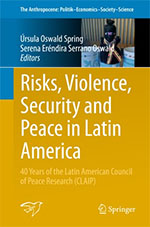APESS
Vol 24 |
Úrsula Oswald Spring, Serena Eréndira Serrano Oswald (Eds.): Risks, Violence, Security and Peace in Latin America. 40 Years of the Latin American Council of Peace Research (CLAIP) (Cham: Springer International Publishing, 2018).
ISBN: 978-3-319-73807-9 (Softcover)
ISBN: 978-3-319-73808-6 (EBook)
Doi: 10.1007/978-3-319-73808-6_ (add chapter no.)
Order this book on Springer Website
|

|
- Analyses social and environmental conflicts and peace processes in Latin America
- Addresses security, drug war, extractivism, development, human rights, peace education and peacebuilding
- Focuses on human rights and environmental risks, indigenous and marginal people
- Proposes sustainable development, just peace and peacebuilding as a constructive responses in the most violent and most biodiverse region
- Offers alternative perspectives of global networks, and scientific and youth organisations
During the past 40 years of the Latin American Council for Peace Research (CLAIP) regional conditions have worsened. This book analyses the war against drugs, violence in streets, schools and families, and mining conflicts. It examines nonviolent negotiations, human rights, peacebuilding and education, explores security in cyberspace and proposes ways to overcome xenophobia, white supremacy, sexism, and homophobia, especially when social inequality increases injustice and violence. Environmental justice was crucial in the recent peace process in Colombia, and is equally crucial in other countries where indigenous people are losing their livelihoods and identity. Climate change is seriously threatening Latin America and the Caribbean, where poor women in particular are exposed to losing their life and well-being, and are forced to migrate. Since the end of the Cold War, capitalism has aggravated the life conditions of poor people. The neoliberal dismantling of the State has reduced their rights and well-being in favour of commercial enterprises. The youth of today are not only the sector most exposed to violence, but also represent the future for a different approach to managing human relations and nature. |